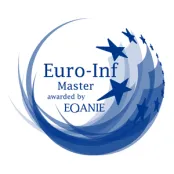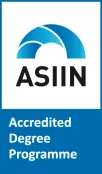
Master's Programme in Software Engineering and Digital Transformation


The programme is accredited by international Euro-Inf® (granted by EQUANIE) and ASIIN standards for high quality degree programmes in engineering.
This master's programme focuses on developing advanced knowledge and expertise for the design and development of software and digital services and the digital transformation of business processes.
The programme addresses the application of engineering principles of software and systems development, including design methodologies, business process and service modelling and re-engineering, operation principles, and maintenance and quality assurance approaches.
Digital transformation in this context refers to the change associated with the application of the software engineering body of knowledge to the transformation and modernisation of digital assets of business and industry.
The programme's basic courses can be completed as distance learning, but the attendance requirements of advanced and elective studies vary. Students admitted to the programme should prepare to attend classes on campus as needed.
You can specialise in one of two areas: Software Engineering or Responsible Information Systems Development.
The Software Engineering specialisation builds on Bachelor's studies in software engineering and aims to develop professional skills in this discipline. Continuing from the common topics of software engineering and other areas of information technology, such as software development, quality assurance and testing or software design, this specialisation provides opportunities for students to engage in and develop abilities for research.
The Responsible Information Systems Development specialisation aims to build expertise in software and service design and redesign, business process re-engineering and digitalisation for modern businesses, and industry workflow digitalisation.
This specialisation offers a fresh start to those who have previously studied 24 ECTS credits or more in computer science or related disciplines (IT/IS or software engineering) but do not have a Bachelor's degree in that domain. The specialisation aims to develop professional skills in this discipline and to provide opportunities for students to engage in research and develop their research.
What will you learn in the programme?
After graduation, you will have a solid foundation in software engineering. You will be able to describe and apply computer science, software engineering knowledge, best practices, and standards appropriate for engineering complex software systems.
You will acquire:
- competence in designing, evaluating, and adapting software processes and software development tools to meet the needs of an advanced development project;
- skills in eliciting user needs and designing an effective software solution;
- knowledge helping to recognise human, security, social, and entrepreneur issues and responsibilities relevant to engineering software and the digitalisation of services;
- a professional network in Finland through practical assignments with real companies throughout your studies.
As a graduate of the Software Engineering specialisation, you will be able to design software systems and define architectures in open and distributed environments in a holistic and integrative manner. You will learn to apply the best software engineering practices and standards to software development and the evolution of diverse types of software systems.
As a graduate of the Responsible Information Systems Development specialisation, you will learn to analyse and develop digital business models and value creation practices through the re-engineering of processes and services. You will also be able to evaluate the business impact and cost benefits of digitalisation on individuals, organisations, society and the world, and design supporting enterprise architectures.
Degree structure and studies
The Master's Programme in Software Engineering and Digital Transformation is a two-year programme. It leads to the degree of Master of Science in Technology, M.Sc. (Tech.), which is 120 ECTS credits.
The programme includes core, advanced specialisation, minor, language and elective studies as well as a Master's thesis. Read more in this academic year’s curriculum.
Career prospects
Understanding different dimensions of software engineering is necessary for any professional today.
There are many reasons why software engineering is so popular, such as good job security, high starting salaries, and diverse job opportunities across industries.
Software engineers may also have flexible work schedules – they can work anywhere where there is a computer and an internet connection.
Possible jobs for graduates of Software Engineering include software developer, software architect, requirements engineer, database administrator, user experience specialist, team leader or project manager.
Possible jobs for graduates of Responsible Information Systems Development include business process analyst, business service innovator, digital transformation consultant, business intelligence manager, project leader, project manager or digital transformer.


